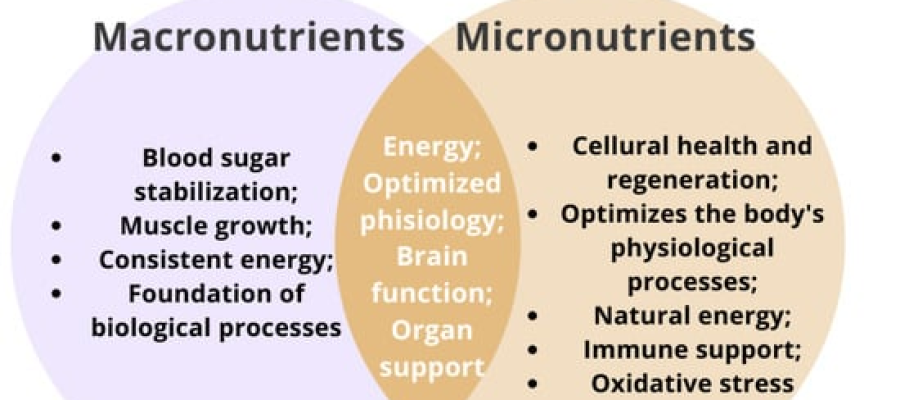What Are Macronutrients and Micronutrients?
In the realm of nutrition, understanding the fundamental components of your diet is crucial for maintaining optimal health. Macronutrients and micronutrients are two categories of nutrients that play distinct roles in your body. While macronutrients provide the bulk of your dietary energy, micronutrients are vital for facilitating a wide range of physiological functions.
Macronutrients consist of carbohydrates, proteins, and fats. These nutrients are required in larger quantities because they provide the energy necessary for daily activities and bodily functions. On the other hand, micronutrients, which include multivitamins and minerals, are needed in smaller amounts. Despite their smaller required quantities, they are indispensable for maintaining health, supporting metabolic processes, and preventing diseases.
Both macronutrients and micronutrients are essential for a balanced diet and optimal well-being. An understanding of these nutrients and their sources can help you make informed dietary choices, ensuring your body receives the nourishment it needs to function effectively.
The Role of Macronutrients in Our Diet
Macronutrients are the cornerstone of your diet, providing the energy necessary for all bodily functions. Each macronutrient plays a unique role:
Carbohydrates: These are your body’s primary energy source. They are broken down into glucose, which fuels your brain, muscles, and other tissues. Consuming adequate carbohydrates is essential for maintaining energy levels throughout the day.
Proteins: Often referred to as the building blocks of the body, high proteins are crucial for growth, repair, and maintenance of tissues. They are composed of amino acids, some of which are essential and must be obtained through your diet.
Fats: Despite their bad reputation, fats are vital for numerous bodily functions. They provide a concentrated energy source, support cell growth, protect organs, and help in the absorption of certain vitamins.
Balancing these macronutrients in your diet is critical for sustaining energy, supporting bodily functions, achieving a healthy weight and body transformation. Understanding how each macronutrient contributes to your overall health can guide you in crafting meals that support your lifestyle and nutritional needs.
The Importance of Micronutrients for Health
While macronutrients provide energy, micronutrients are crucial for maintaining the body’s physiological functions. These small yet mighty nutrients include:
Vitamins: Organic compounds that facilitate various biochemical reactions. Each vitamin serves a specific purpose, such as vitamin C’s role in supporting the immune system and vitamin D’s contribution to bone health.
Minerals: Inorganic elements that assist in processes like bone formation, oxygen transport, and enzyme activation. Key minerals include calcium, potassium, iron, and zinc.
Micronutrients are essential for preventing deficiencies that can lead to serious health issues. For example, a lack of vitamin A can cause vision problems, while inadequate iron intake may result in anemia. Ensuring a diet chart rich in diverse foods can help you meet your micronutrient needs and promote overall well-being.
Key Differences between Macronutrients and Micronutrients
Understanding the differences between macronutrients and micronutrients is essential for crafting a balanced diet. Here are the primary distinctions:
Quantity Required: Macronutrients are needed in larger amounts, typically measured in grams, while micronutrients are required in smaller quantities, often in milligrams or micrograms.
Function: Macronutrients provide energy and structural components for the body, whereas micronutrients support metabolic processes and physiological functions.
Sources: Macronutrients are found in foods like grains, meats, and oils, while micronutrients are abundant in fruits, vegetables, nuts, and dairy products.
Recognizing these differences can help you make informed dietary decisions. By ensuring you consume an adequate amount of both macronutrients and micronutrients, you can support your body’s energy needs and overall health.
How to Balance Macronutrients and Micronutrients in Your Diet
Achieving a balance of macronutrients and micronutrients is crucial for optimal health. Here are some strategies to help you maintain this balance:
Diverse Diet: Incorporate a wide range of foods in your meals to ensure you obtain all necessary nutrients. This includes fruits, vegetables, whole grains, lean proteins, and healthy fats.
Portion Control: Monitor portion sizes to prevent overconsumption of macronutrients, which can lead to weight gain. Balance your plate with recommended proportions of carbohydrates, proteins, and fats.
Mindful Eating: Pay attention to your body’s hunger and fullness cues. Eating mindfully can help you make better food choices and prevent overeating.
By integrating these practices into your daily routine, you can create a diet that provides the energy and nutrients your body needs, enhancing your health and well-being.
Common Sources of Macronutrients
To ensure you are consuming sufficient macronutrients, it’s important to know their common sources:
Carbohydrates: Found in foods like whole grains (brown rice, oats), fruits (bananas, apples), and vegetables (sweet potatoes, corn).
Proteins: Available in animal sources like meat, poultry, fish, and eggs, as well as plant-based options such as beans, lentils, tofu, and nuts.
Fats: Present in oils (olive, coconut), nuts, seeds, avocados, and fatty fish like salmon and tuna.
Including a variety of these foods in your diet can help you meet your macronutrient needs and support your body’s energy requirements.
Essential Micronutrients and Their Food Sources
Micronutrients are vital for health, and obtaining them from food is essential. Here are some key micronutrients and their sources:
Vitamin A: Found in carrots, sweet potatoes, and spinach, it supports vision and immune function.
Vitamin C: Abundant in citrus fruits, berries, and bell peppers, it aids in collagen production and immune defense.
Iron: Available in red meat, beans, and fortified cereals, it is crucial for oxygen transport and energy production.
Calcium: Present in dairy products, leafy greens, and fortified plant milks, it is essential for bone health and muscle function.
Incorporating these foods into your meals can help you meet your micronutrient needs and maintain optimal health.
The Impact of Macronutrient and Micronutrient Deficiencies
Nutrient deficiencies can have significant health consequences. Understanding the impact of these deficiencies is crucial for preventing them:
Macronutrient Deficiencies: Inadequate intake of carbohydrates, proteins, or fats can lead to fatigue, muscle loss, and weakened immune function. For instance, insufficient protein can impair muscle growth and repair.
Micronutrient Deficiencies: Lack of essential vitamins and minerals can result in conditions like scurvy (vitamin C deficiency), rickets (vitamin D deficiency), and anemia (iron deficiency). These deficiencies can affect overall health, energy levels, and disease resistance.
Addressing nutrient deficiencies through a balanced diet or supplements, if necessary, is vital for maintaining health and preventing long-term issues.
Tips for Tracking Your Macronutrient and Micronutrient Intake
Effectively tracking your nutrient intake can help you maintain a balanced diet. Here are some tips to guide you:
Food Journals: Keeping a food diary can help you monitor your daily consumption and identify areas for improvement.
Nutritional Apps: Use smartphone apps to track your macronutrient and micronutrient intake and set dietary goals.
Professional Guidance: Consult a nutritionist or dietitian for personalized advice and to ensure you’re meeting your nutritional needs.
By implementing these strategies, you can stay informed about your dietary habits and make necessary adjustments to support your health.
Conclusion: Achieving Optimal Health through Balanced Nutrition
Achieving optimal health requires a balanced intake of both macronutrients and micronutrients. By understanding the roles of these nutrients, you can make informed dietary choices that support your body’s needs. Emphasizing variety, portion control, and mindful eating will help you maintain a diet that fosters energy, vitality, and overall well-being.
Please review our business on Google Yelp Facebook
Please visit our Member’s Area to access 100’s of health and fitness topics.
Did you know you can work out and exercise with a trainer at your home, office, hotel room, or anywhere in the world with online personal training?
Like us on Facebook/Connect with us on LinkedIn/Follow us on X
Make sure to forward this to friends and followers!






